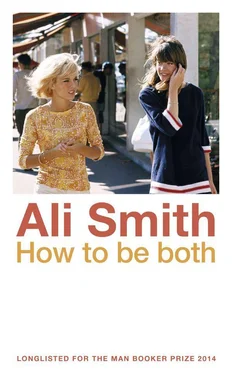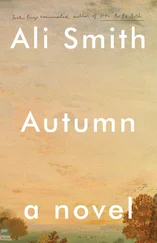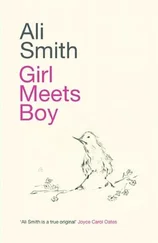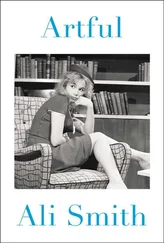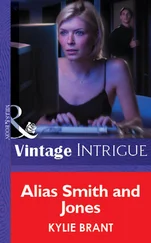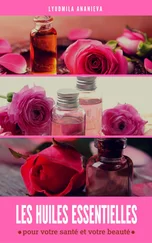Air came out of her mouth (by which I knew that what I’d done was good): she nearly dropped the eggs (by which I learned that the making of images is a powerful thing and may if care’s not taken lead to breakage): she checked the eggs were safe in her dress, all unbroken, before she called him over to see his faces.
When he saw the angry one he hit me over the head with the inside of his hand (by which I learned that people do not always want to know how they are seen by others).
He and my mother stood and looked for a time at his faces in the dust.
Not long after this, he began to teach me my letters.
Then, when my mother was gone into the ground, and me still small enough to, one day I climbed into her clothes trunk in her bedroom and pulled the lid down: it was all broadcloth and linens and hemp and wool, belts and laces, the chemise, the work gowns, the overgown, the kirtle and sleeves and everything empty of her still smelling of her.
Over time the smell of her faded, or my knowing of it lessened.
But in the dark in the trunk I was expert and could tell almost as well as if I was seeing which was which, which dress, which usage, by the feel of it between finger and thumb: kitchen use, Sunday use, work use: I went deep in the smell and became myself nothing but fabric that’d once been next to her skin: in the dark between the layers I shoved down or up with a fist and felt for a tapering strip, a ribbon or tie or lace coming off the edge of one of the sleeves or collars, a tassel, a strand of whatever, and was awake till I’d twisted and wound something of her round a thumb or a finger: at which point I was able to sleep: when I woke I’d have freed myself up unawares in my sleep from the tether I’d made: but there’d still be a curlicue shape in the strand of stuff afterwards which held for a time, before it went back to the shape of its own randomness.
One day when I woke and opened the lid and came back to the daylight the cloth I’d been asleep in dragged out after me, blue, still warm from me: I sat beside it on the floor: I put my head and my arms into it then my whole self inside it: it sat on my shoulders and spread out away from me, it so big and me so small it was as if I’d dressed in a field of sky.
I put my head through the slit in the sleeve as if it was the neck opening: I dragged the dress through the house, me in it.
I wore nothing but her clothes from then on: I dragged them in the housedust for weeks, my father too weary to say no, until the day he picked me up in his arms (I was wearing the white one, big, filthy now, ripped a bit where I’d tripped on the stones one day and where it’d caught on the doorframe another, today I was all sweat and heat in it, my face a colour I could feel) so that the trail of the heavy materials left the floor and hung behind us both over his forearm like a great empty fishtail as he carried me through to her room.
I thought he would beat me, but no: he sat me down still in her overgown on the shut trunk of clothes: he himself sat down on the floor in front of me.
I’m going to ask you kindly to stop wearing these clothes, he said.
No, I said.
(I said it from behind the stiff shield of the front of the dress.)
I can’t bear it, he said. It is like your mother has become a dwarf and as if her dwarf self is always twinkling away in all the corners of the house and the yard, always in the corner of my eye.
I shrugged.
(But cause the shoulders were so high over my own deep in the dress, no one but me knew I’d shrugged.)
So I would like to make a suggestion, he said. If you agree to put these clothes away. I mean stop wearing them.
I shook my head slow from side to side.
And if you were to put, say, breeches on, or these leggings I’ve here, instead —, he said.
He put his hand in his smock pocket and pulled out boys’ clothes, light and thin in the heat: he dangled them enticing like you do with a mouthful of green a mule that won’t be moved.
— then I can get you a job and a schooling, he said. For the job, you can come and work with me at the cathedral. It would be a help to me. I need help. I need an apprentice, about your age. You could be that help.
I lowered myself down inside the dress: the shoulders came up above my ears.
You already have my brothers, I said.
You could be like your brothers, he said.
I eyed him through the lace-up of the neck and the chest: I spoke through the holes in the dress.
You know I am not like my brothers, I said.
Yes, but listen, he said. Cause maybe. Maybe. If you were to stop wearing these too-big clothes and were to wear, let’s say, these boys’ clothes instead. And maybe if we allow ourself a bit of imagining. And maybe if we have a bit of discretion. You know what discretion is?
I rolled my eyes in behind the chestlace for even as a child I already knew, or so I believed, more than he ever would, what discretion is: worse, I knew he was pandering to me with his making of suggestions, more my mother’s style than his, when it would’ve been much more usual for him simply to hit me and forbid me: I despised him a bit for this pandering and for using what he considered big words as if these might be the key to me agreeing to do as he wanted.
But the words he used next were the biggest of all, the biggest words anyone could’ve.
If you were, he said. Then we might find someone to train you up in the making and using of colours on wood and on walls, you being so good with your pictures.
Colours.
Pictures.
I stuck my head so fast out the top of the dress that the weight of the dress shifted and nearly knocked me off the box: I saw him stifle and have to disguise, cause he wanted to keep the moment serious, the first smile I’d seen on his face since the going of my mother.
But you’ll have to wear your brothers’ clothes, he said. And you might, if I find you a training, best be, or become, one of them. Your brothers.
He looked to see my response.
I nodded: I was listening.
We can probably get you Latin without it, and mathematics, he said. But schooling will be easier with it. We are not rich though we’ve more than enough and schooling in itself is not the problem. But unless you enter a nunnery, which is the one sure way you can spend your days making colours or filling the pages of holy saint books with your pictures, a training in colours and pictures — I mean out here in the world, with a life lived as a part of it, a life beyond walls — is another thing altogether. Do you agree?
He looked me in the eye.
It is a sure thing always, he said. You would always have work. But nobody will take you for such a training wearing the clothes of a woman. You can’t even be an apprentice to me, wearing the clothes of a woman. I think we could start you working with me next week on the bell tower. By which I don’t mean you’ll work on the bell or the tower, I mean I will let you draw it and furnish you with the materials to, and in this way you’ll be seen to be working with me and your brothers, and then, when you are established, when it is clearly established in others’ eyes as to who you have become –
He raised an eyebrow.
— we will get you into a painters’ workshop or find you a master of panels and frescoes and so on, and we will show him what you can do and we will see if he’ll take you on.
I looked down at the front of my mother’s gown then looked back up at my father.
Such a master might let us pay in eggs, or birds, he said, or the fruit off our trees, or even in bricks. I am hopeful. But most of all I’m hopeful that if such a man sees what you can already do he might teach you for less, for the sake of doing justice to your abilities, and show you how to correct your natural mistakes, how to shape the head of a man like they do with their squares and geometries, and bodies too, and the measurements it takes, how to make those measurements, the ones which show where to put the eyes and the nose and so on in a face and where to place things on the tiles of a floor or across a landscape to show some things closer and some much further away.
Читать дальше
